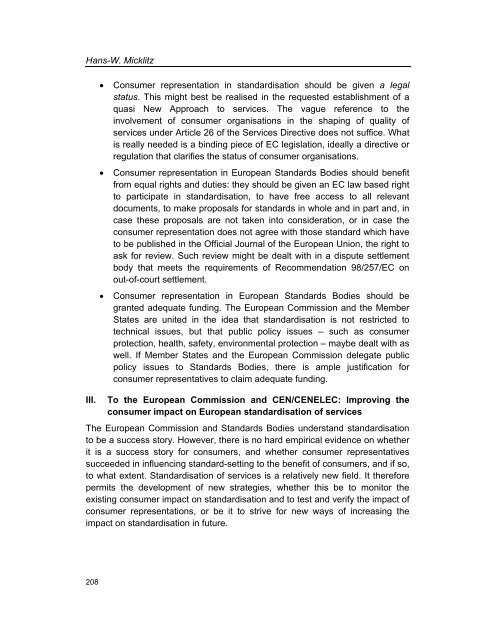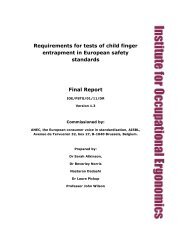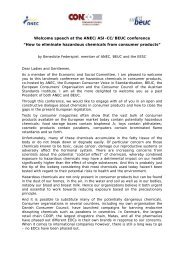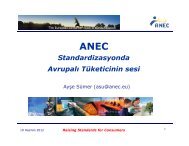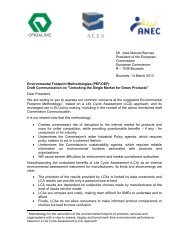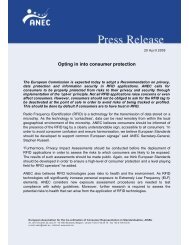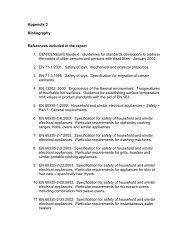Services Standards: Defining the Core Consumer Elements ... - ANEC
Services Standards: Defining the Core Consumer Elements ... - ANEC
Services Standards: Defining the Core Consumer Elements ... - ANEC
Create successful ePaper yourself
Turn your PDF publications into a flip-book with our unique Google optimized e-Paper software.
Hans-W. Micklitz<br />
• <strong>Consumer</strong> representation in standardisation should be given a legal<br />
status. This might best be realised in <strong>the</strong> requested establishment of a<br />
quasi New Approach to services. The vague reference to <strong>the</strong><br />
involvement of consumer organisations in <strong>the</strong> shaping of quality of<br />
services under Article 26 of <strong>the</strong> <strong>Services</strong> Directive does not suffice. What<br />
is really needed is a binding piece of EC legislation, ideally a directive or<br />
regulation that clarifies <strong>the</strong> status of consumer organisations.<br />
• <strong>Consumer</strong> representation in European <strong>Standards</strong> Bodies should benefit<br />
from equal rights and duties: <strong>the</strong>y should be given an EC law based right<br />
to participate in standardisation, to have free access to all relevant<br />
documents, to make proposals for standards in whole and in part and, in<br />
case <strong>the</strong>se proposals are not taken into consideration, or in case <strong>the</strong><br />
consumer representation does not agree with those standard which have<br />
to be published in <strong>the</strong> Official Journal of <strong>the</strong> European Union, <strong>the</strong> right to<br />
ask for review. Such review might be dealt with in a dispute settlement<br />
body that meets <strong>the</strong> requirements of Recommendation 98/257/EC on<br />
out-of-court settlement.<br />
• <strong>Consumer</strong> representation in European <strong>Standards</strong> Bodies should be<br />
granted adequate funding. The European Commission and <strong>the</strong> Member<br />
States are united in <strong>the</strong> idea that standardisation is not restricted to<br />
technical issues, but that public policy issues – such as consumer<br />
protection, health, safety, environmental protection – maybe dealt with as<br />
well. If Member States and <strong>the</strong> European Commission delegate public<br />
policy issues to <strong>Standards</strong> Bodies, <strong>the</strong>re is ample justification for<br />
consumer representatives to claim adequate funding.<br />
III. To <strong>the</strong> European Commission and CEN/CENELEC: Improving <strong>the</strong><br />
consumer impact on European standardisation of services<br />
The European Commission and <strong>Standards</strong> Bodies understand standardisation<br />
to be a success story. However, <strong>the</strong>re is no hard empirical evidence on whe<strong>the</strong>r<br />
it is a success story for consumers, and whe<strong>the</strong>r consumer representatives<br />
succeeded in influencing standard-setting to <strong>the</strong> benefit of consumers, and if so,<br />
to what extent. Standardisation of services is a relatively new field. It <strong>the</strong>refore<br />
permits <strong>the</strong> development of new strategies, whe<strong>the</strong>r this be to monitor <strong>the</strong><br />
existing consumer impact on standardisation and to test and verify <strong>the</strong> impact of<br />
consumer representations, or be it to strive for new ways of increasing <strong>the</strong><br />
impact on standardisation in future.<br />
208


